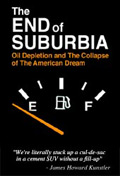
Now that gas prices at the pump have fallen from their peaks, it seems that many people have already forgotten about our economy’s dependence on imported oil. The impact of our oil addiction has had and will have major macro consequences, and a lot of solutions are in being discussed. . Should energy policy get the same attention in macro as fiscal and monetary policy? I think so. Assuming oil prices are likely to remain high and increase in the future, which most economists do, what are the contours of a viable energy policy.
In one of his most striking declarations in his 2006 State of the Union address, Mr. Bush said "America is addicted to oil" and set a goal of replacing 75 percent of the nation's Mideast oil imports by 2025 with ethanol and other energy sources. The President promoted the construction of nuclear power plants and renewed a call for the development of alternative fuel for automobiles, including ethanol, which is made from corn, as well as the development of fuel made from the waste of plant crops.
In one of his most striking declarations in his 2006 State of the Union address, Mr. Bush said "America is addicted to oil" and set a goal of replacing 75 percent of the nation's Mideast oil imports by 2025 with ethanol and other energy sources. The President promoted the construction of nuclear power plants and renewed a call for the development of alternative fuel for automobiles, including ethanol, which is made from corn, as well as the development of fuel made from the waste of plant crops.
President Bush, a former Texas oil executive, was hardly the first president to discover our economy’s addiction to foreign oil. You might want to review a speech that President Jimmy Carter gave on April 18, 1977. (You can watch it online courtesy of PBS.) It was the speech that established the strategic petroleum reserve, birthed the modern solar power industry, led to the insulation of millions of American homes, and established America's first national energy policy. "With the exception of preventing war," said Jimmy Carter, a man of peace, "this is the greatest challenge our country will face during our lifetimes."
Carter added: "It is a problem we will not solve in the next few years, and it is likely to get progressively worse through the rest of this century. We must not be selfish or timid if we hope to have a decent world for our children and grandchildren.” That speech was given thirty years ago!
"We simply must balance our demand for energy with our rapidly shrinking resources. By acting now, we can control our future instead of letting the future control us." Carter bluntly pointed out that: "The most important thing about these proposals is that the alternative may be a national catastrophe. Further delay can affect our strength and our power as a nation." He called the new energy policy he was proposing, "[T]he 'moral equivalent of war' -- except that we will be uniting our efforts to build and not destroy."
Watching Carter’s speech gave me a profound sense of deja vu? What happened to the Carter energy program? If you are interested in this topic, you might want to check out this very informative CNN special and website, which was created earlier this year: We Were Warned: Tomorrow's Oil Crisis.
An interesting new twist of our oil addiction is a possibility called "peak oil." Google the term, and you will see lots of debate. Many geologists and economists believe that oil production will decline in the world no matter how high prices go. If the "peak oil" theorists are correct, much higher oil and gasoline prices are inevitable. Many alternative technologies will become economically viable. Will the societies that take peak oil seriously be the ones that do better in the future? Are the President's proposals bold enough?
For a limited time, a 52 minute documentary video about the implications of peak oil for our society called "The End of Suburbia" is available for free online viewing at Youtube. Warning: this video is not for the faint of heart! Please watch the video at your own risk.
Some obvious Discussion Board questions on this topic include:
1. How does an increase in oil prices affect aggregate demand and supply, and the price level?
2. Is there evidence that we are near a global oil production peak? If so, what will be the implications for our economy?
Extra Credit: What percentage of our current energy usage does the United States currently import? Cite your source. If you are the first student to send me an e-mail (kwoodward@saddleback.edu) with the answer, you will be rewarded with two extra credit Discussion Board points. Only two points extra credit per student can be earned in any given week from the blog questions.
No comments:
Post a Comment